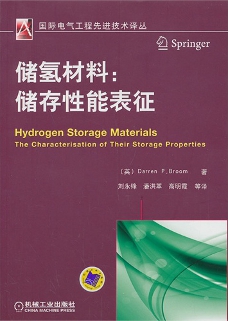
October 2013 · 194 pp. · Softcover
- RMB 68.00
The Characterisation of Their Hydrogen Storage Properties
Darren P. Broom
Translated by Yongfeng Liu
The problem of storing hydrogen safely and effectively is one of the major technological barriers currently preventing the widespread adoption of hydrogen as an energy carrier and the subsequent transition to a so-called hydrogen economy. Practical issues with the storage of hydrogen in both gas and liquid form appear to make reversible solid state hydrogen storage the most promising potential solution. Hydrogen Storage Materials addresses the characterisation of the hydrogen storage properties of the materials that are currently being considered for this purpose.
The background to the topic is introduced, along with the various types of materials that are currently under investigation, including nanostructured interstitial and complex hydrides, and porous materials, such as metal-organic frameworks and microporous organic polymers. The main features of Hydrogen Storage Materials include:
- an overview of the different types of hydrogen storage materials and the properties that are of interest for their practical use;
- descriptions of the gas sorption measurement methods used to determine these properties, and the complementary techniques that can be used to help corroborate hydrogen uptake data; and
- extensive coverage of the practical considerations for accurate hydrogen sorption measurement that drive both instrument design and the development of experimental methodology.
Buy Now at Amazon.cn
"When compared with fossil fuels, hydrogen comes out on top in every comparison, except one. Hydrogen is the lightest fuel, the most efficient fuel and the cleanest fuel. However, for a given amount of energy, its storage is heavier and takes more volume, as compared with fluid fossil fuels, i.e., petroleum and natural gas. Hence, extensive R&D activities around the world are taking place in order to improve the gravimetric and volumetric storage properties of hydrogen. In this respect, Hydrogen Storage Materials offer the best promise. The book Hydrogen Storage Materials: The Characterisation of Their Storage Properties by Darren P. Broom admirably presents the latest knowledge and research results on this important topic. Consequently, I strongly recommend this book to hydrogen energy scientists and engineers in general, and to those involved in the storage of hydrogen in particular."
T. Nejat Veziroglu, President of the International Association for Hydrogen Energy
"The book contains an impressive number of useful and topical references, and a descriptive introductory chapter outlining the search for a viable solid state store...[It] provides a good overview of these developments which sets the scene for the subsequent chapters which concentrate in commendable detail on the measurement techniques...In summary therefore, the search for a viable, lightweight solid state hydrogen storage material continues and to aid this task, this book provides a very valuable addition to a researcher's shelf."
Rex Harris, International Journal of Hydrogen Energy, Volume 37, Issue 9 (2012) p. 7950-7951
 |
Yongfeng Liu is a
Professor in the Department of Materials Science and
Engineering at Zhejiang University, China. His
research is focussed on solid-state hydrogen storage
materials and electrode materials for rechargeable
batteries. He received his PhD in Materials Science
and Engineering from Zhejiang University in 2005. He
then moved to the National University of Singapore
as a postdoctoral research fellow. He joined
Zhejiang University as an Associate Professor in
2007, and was promoted to Professor in 2012.
Professor Liu has obtained 15 Chinese patents and
published more than 120 scientific papers in
international peer-reviewed journals, which have
been cited 2200 times with a H-index of 27. He is a
reviewer for Chemical Communications, Journal
of Materials Chemistry, Journal of
Physical Chemistry, Physical Chemistry
Chemical Physics, International Journal of
Hydrogen Energy, Journal of Alloys and
Compounds, Electrochimica Acta,
amongst others. |
Prof. Yongfeng Liu,
Department of Materials Science and Engineering
Zhejiang University
Hangzhou 310027
P. R. China
Email: mselyf@zju.edu.cn
Professor Yongfeng Liu's homepage at Zhejiang University
Back to the English edition page
Please send any comments, questions, suggestions or corrections to darrenbroom@inbox.com